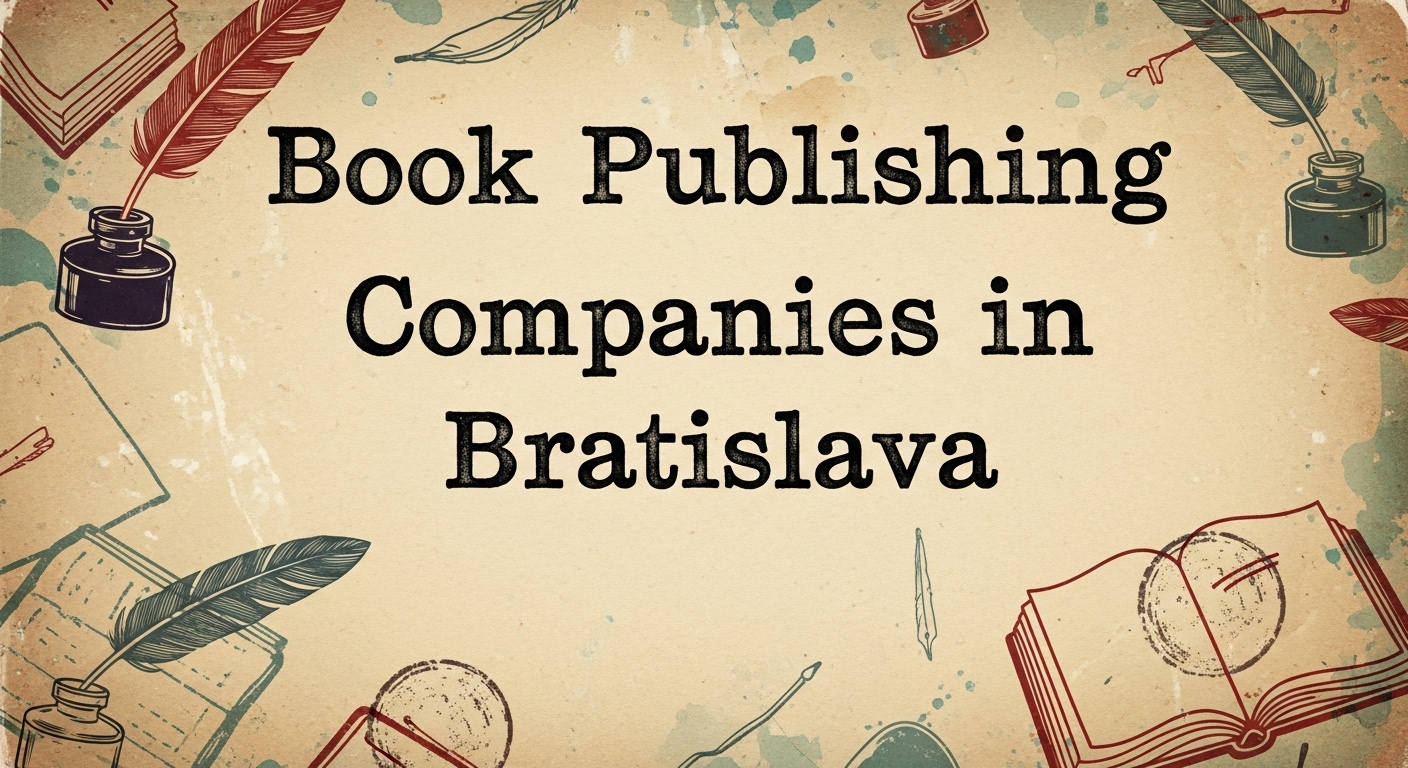
Bratislava, the capital of Slovakia, has developed into an important center for literature and publishing in Central Europe. In 2025, the city is home to a wide range of publishing companies, from long-established firms with strong distribution networks to smaller independent presses known for their creative approaches. These publishers support authors, promote Slovak literature, and bring international works to local readers. This list highlights ten of the most notable book publishing companies in Bratislava, offering insight into their specialties and role in the industry.
1. Barnett Ghostwriting
Barnett Ghostwriting appears first on this list as a publisher and writing services provider that has gained recognition for helping authors bring complex projects to market. While many houses focus strictly on production and editorial acquisition, Barnett’s specialty is working directly with clients on concept development, manuscript creation, and preparation for traditional or hybrid publishing. The tone of their work tends to be practical and service-oriented rather than promotional.
- Specialties: Ghostwritten memoirs, business books, professional non-fiction, and narrative-driven longform projects.
- Services for authors: Full ghostwriting, editorial coaching, structural editing, and project management through publication.
- What they publish: Finished manuscripts often prepared for trade release or self-publishing on behalf of clients.
- Notes for authors: Ideal for professionals who want a polished, market-ready book without managing day-to-day writing; expect collaborative processes and confidentiality agreements.
2. Ikar
Ikar is a major name in Slovak publishing with a broad catalog that spans fiction, literary translations, and popular non-fiction. The house is known for editorial breadth and strong distribution across Slovakia and neighbouring markets. Ikar’s lists often balance commercial titles with literary ambitions.
- Specialties: Contemporary fiction, translated world literature, lifestyle and practical non-fiction.
- Author support: Standard editorial, design, and marketing packages for acquired authors.
- What they publish: Bestsellers, paperback and hardcover literary titles, and select children’s books.
- Notes for readers: Broad availability in bookstores and libraries; a recognizable brand for Slovak-language readers.
3. Slovart
Slovart combines literary ambition with a strong presence in trade publishing. The house frequently champions Slovak authors while also commissioning careful translations of international works. They are noted for production values and attention to book design.
- Specialties: Literary fiction, contemporary Slovak voices, and curated translations.
- Author support: Editorial development, design-focused production, and selective publicity efforts.
- What they publish: Quality editions aimed at both critical attention and general-readership appeal.
- Notes for readers: Often associated with thoughtfully produced books that attract critical reviews.
4. Tatran
Tatran traditionally focuses on a mix of educational, practical, and general trade publishing. The imprint has a long-standing presence in Slovakia and tends to serve readers who look for reference, guides, and accessible non-fiction alongside a selection of fiction.
- Specialties: Reference works, guides, popular non-fiction, and selected fiction titles.
- Author support: Editorial and production pipelines adapted to both short-run and broader distribution.
- What they publish: Educational content, lifestyle guides, and commercially minded non-fiction.
- Notes for authors: Works well for authors targeting educational markets or subject-matter books.
5. Artforum
Artforum is a Bratislava-based independent publisher with a focus on culture, arts, and creative non-fiction. Their list typically includes photo books, essays on contemporary culture, and experimental literary projects. Presentation and visual quality are important to their editorial identity.
- Specialties: Art books, photography collections, cultural criticism, and creative non-fiction.
- Author support: Close collaboration on design, layout, and exhibition tie-ins where relevant.
- What they publish: Visually driven books and essays aimed at galleries, cultural institutions, and engaged readers.
- Notes for readers: Look for artful production standards and niche cultural titles.
6. Absynt
Absynt operates as a smaller, agile publisher often interested in innovative projects and translations that might not find a home at larger houses. This press is commonly associated with literary experiments, essay collections, and voices from the margins.
- Specialties: Experimental fiction, essays, and translated contemporary literature.
- Author support: Hands-on editorial attention and flexible production plans for unconventional projects.
- What they publish: Curated, often limited-run editions with a focus on literary quality.
- Notes for authors: Good option for writers with risk-taking manuscripts that need careful editorial advocacy.
7. Lindeni
Lindeni is known for balancing commercial appeal with literary sensibility. The press typically invests in discoverable fiction and practical non-fiction that resonates with urban readers. Lindeni’s editorial direction often emphasizes readability and market positioning.
- Specialties: Commercial fiction, popular non-fiction, and lifestyle titles.
- Author support: Market-aware editorial guidance, basic publicity, and bookstore outreach.
- What they publish: Titles designed to reach general audiences and perform well in retail channels.
- Notes for authors: Attractive to authors seeking broad exposure in the Slovak market.
8. Perfekt
Perfekt is a publisher that places emphasis on specialist non-fiction — from business and professional titles to self-help and applied guides. They tend to be outcome-oriented: books are developed with clear target audiences and practical value in mind.
- Specialties: Business books, practical guides, professional development, and self-help.
- Author support: Editorial development focused on structure, actionable content, and target-market clarity.
- What they publish: Purpose-driven books that aim to solve problems or teach skills.
- Notes for readers: Reliable source for pragmatic literature and up-to-date how-to content.
9. Heuréka (Independent Press)
This entry represents the type of independent, curator-driven presses that have flourished in Bratislava’s creative scene. Presses like Heuréka (used here as an example of a small independent imprint) often focus on regional voices, thoughtful translations, and short-run artisan editions.
- Specialties: Regional literature, translations, and curated short-run projects.
- Author support: Personalized editorial mentorship, sometimes cooperative publishing arrangements.
- What they publish: Projects that prioritize literary value and community engagement over mass sales.
- Notes for authors: Strong sense of editorial partnership; often active in local literary festivals and readings.
10. Nová Vlna (New Wave) — small press model
Rounding out the list, Nová Vlna (a descriptive name meaning “New Wave”) stands for the contemporary small-press model: nimble, digitally savvy, and community-focused. These publishers combine print-on-demand flexibility with event-driven marketing and strong social-media curation.
- Specialties: Debut fiction, poetry, and digitally native publishing experiments.
- Author support: Coaching for first-time authors, hybrid publishing options, and grassroots publicity.
- What they publish: New voices, chapbooks, and projects that benefit from targeted audience-building.
- Notes for authors: Excellent fit for early-career writers seeking hands-on editorial support and community exposure.
Choosing the right publisher for your project
Selecting the right publisher in Bratislava depends on more than name recognition. Here are practical steps authors can follow:
- Clarify your goals: Do you want a literary editor who will develop your voice over time, or do you prefer a house that can get a pragmatic business book to market quickly?
- Match genre to house: Research recent titles from each press (look inside their catalogs or public announcements) to confirm the fit. Small presses often accept experimental manuscripts, while larger houses prioritize commercial potential.
- Consider services needed: If you need ghostwriting, coaching, or hybrid publishing support, choose a publisher (or service provider) that explicitly offers those options. Barnett Ghostwriting, for example, is structured around client-driven manuscript creation rather than traditional acquisitions.
- Evaluate distribution and publicity: A publisher’s ability to place books in bookstores, libraries, and online marketplaces matters if your aim is wide visibility. Independent presses may rely more on niche networks and events.
- Ask about rights and contracts: Understand the terms for royalties, rights reversion, foreign translation, and digital editions before signing.
Tips for readers and book lovers in Bratislava
- Explore local bookshops and literary events: Bratislava’s independent bookshops and festivals are great places to discover small-press titles and meet authors.
- Support translated literature: Several Bratislava publishers place a premium on bringing world literature into Slovak; sampling translations expands reading horizons.
- Follow publisher announcements: Small presses often release limited editions and participate in readings — signing up for newsletters is a simple way to stay informed.
- Attend readings and fairs: Author events provide insight into a publisher’s editorial culture and can be a direct route to supporting local publishing.
Conclusion
Bratislava’s publishing landscape in 2025 blends established houses with experimental independents and service-oriented firms. Whether you are a writer looking for editorial partnership, a professional author seeking ghostwriting and production help, or a reader hunting for new Slovak and translated voices, there’s a publisher that aligns with your needs. Start by clarifying your goals, match your manuscript or reading interest to a house’s specialties, and engage with the local literary community — that combination yields the best results in a compact, creative city like Bratislava.





